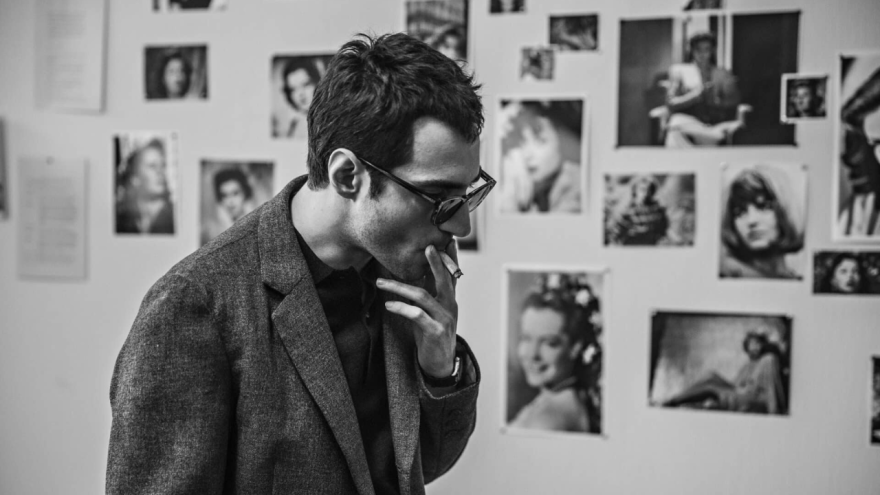DAN WEBSTER:
When it comes to the films of Richard Linklater, the only thing we’ve come to expect is… the unexpected. His career, which began more than 35 years ago, has been all over the place. And his latest release, Nouvelle Vague—which is streaming on Netflix—is a good example.
Nouvelle Vague, by the way, is French for "new wave." And it refers specifically to the group of filmmakers who emerged in post-war France and consisted mainly of critics working for the Paris magazine Cahiers du Cinema—which translates as "Notebooks on Cinema."
Many of the important figures in the New Wave began making films in the 1950s. Among them were Francois Truffaut, Claude Chabrol, Agnes Varda among others. Yet one stood out—Jean-Luc Godard, the man whom legendary film critic Manny Farber once referred to as “the Matisse of modern film.”
It is Godard (played by Guillaume Marbeck) on whom Linklater focuses in Nouvelle Vague, which I need to stress is not a documentary. It is, instead, a narrative project that in many ways resembles something many of those same New Wave proponents might have put on film: Linklater renders it in black and white, he casts it with actors who even to French audiences are unfamiliar, and he uses mostly ordinary settings and natural lighting.
And as he makes clear, the self-styled wunderkind who is his focus, Godard, is at first hardly anything resembling what he would eventually become: a brilliant, utterly individualistic and influential filmmaker. When Linklater’s film begins, Godard is—more than anything—merely talk.
Talk he can, though, which puts him in good company. After watching the 1958 film La Passe de Diable with three of his confidantes, Truffaut, Chabrol and Suzanne Schiffman, the three dismiss it outright. “Well, “Godard says, “now we know. All civilization is mortal.” The others respond by saying, “Even this film.” To which Truffaut adds, “Especially this film.”
Just a few minutes later, in search of the free drinks as the post-screening party, Godard is even more direct with the film’s producer, Georges de Beauregard, describing the film as a load of… well, feces. Yet almost immediately, Godard attempts to get de Beauregard to produce a script that he has been laboring to make.
The producer passes. But, he says, he will help out Godard if he’s willing to do a script written by Truffaut and if Chabrol can assist. That film turns out to be like nothing that anyone had ever seen. Its title: Breathless.
And here is what I mean by saying that Linklater tends to go in unexpected directions. His first film to draw attention was 1990’s Slacker, an example of guerrilla filmmaking following a range of characters in Austin, Texas. He followed up with his first real success, the high-school study Dazed and Confused—the movie that introduced a number of actors who would become stars, from Ben Affleck to Parker Posey to Matthew McConaughey.
From there Linklater has alternated between A-list movies (School of Rock, Bad News Bears), inventive independent productions (A Scanner Darkly, Apollo 10½: A Space Age Childhood) and personal studies that flout traditional filmmaking style (his Before trilogy, his 12-years-in-the-making project Boyhood).
Nouvelle Vague fits right in there, with Linklater working with an all-French crew, shooting on a 30-day schedule (to shoot Breathless Godard had 20 days), filming not just in black and white but with the same kinds of camera lenses and with an old-school aspect ratio to give his film its 1960s look.
The result is a movie about the making of Godard’s movie that looks classic while capturing the feel of a time when film was being reinvented. Yet, too, even while being faithful to the era’s principal characters, the film maintains an undercurrent of humor throughout. Guillaume is spot on as Godard, as are Zoey Deutch as Jean Seberg and Aubry Dullin as Jean-Paul Belmondo.
This much you can expect: When someone says of Godard, “He’s the real genius. At least that’s what he’ll tell you,” and you can both smile and know the truth of the statement, you know that Linklater is capturing the truth.
For Spokane Public Radio, I’m Dan Webster.
——
Movies 101 host Dan Webster is the senior film critic for Spokane Public Radio and a blogger for spokesman.com.


